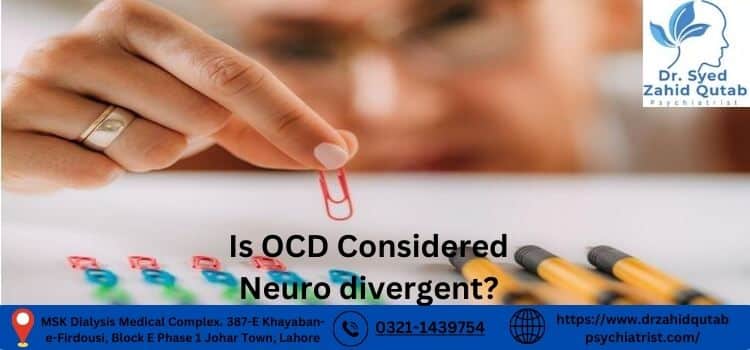Most people asked Is OCD Considered Neuro divergent? Yes, OCD (Obsessive Compulsive Disorder) is considered a form of neurodiversity. Neurodiversity refers to the natural variation in brain function and behavior among individuals, including those with neurodevelopmental disorders such as autism spectrum disorder, ADHD, and OCD.
In this blog post, we will explore what neurodiversity is and how OCD fits into this concept.
Let’s dive in to get more details.
Is OCD Considered Neuro divergent?

Most people asked Is OCD Considered Neuro divergent? Neurodiversity is a concept that recognizes and values the differences in brain function and behavior among individuals. It acknowledges that everyone’s brain works differently, and these differences should be respected and celebrated.
One way to think about neurodiversity is through the analogy of biodiversity. Just as biodiversity refers to the variety of plant and animal species in the world, neurodiversity refers to the variety of brain types and ways of thinking.
Neurodiversity covers a broad range of neurological conditions, including developmental disorders like autism and ADHD, as well as mental health conditions like OCD.
So, is OCD considered neuro divergent? The short answer is yes. Let’s take a closer look at how OCD fits into the concept of neurodiversity.
What is OCD?
Obsessive Compulsive Disorder (OCD) is a mental health condition characterized by obsessions and compulsions. Obsessions are intrusive thoughts, images, or urges that cause anxiety and distress. Compulsions are repetitive behaviors or mental acts that a person feels driven to perform in response to their obsessions. These compulsions are often aimed at reducing or preventing the anxiety caused by obsessions.
OCD is a complex disorder that can manifest in many different ways. Some people may have primarily obsessions, while others may have primarily compulsions. Some individuals may experience both obsessions and compulsions equally.
How OCD Fits into Neurodiversity?
As mentioned earlier, neurodiversity includes a wide range of neurological conditions, including mental health disorders like OCD. While some may view OCD as a “disorder,” the neurodiversity approach recognizes it as a natural variation in brain function and behavior.
Individuals with OCD process information differently than those without the condition. This difference in brain functioning is what makes them neuro divergent. They have unique strengths and challenges that are valuable and should be embraced.
Embracing Neurodiversity
The concept of neurodiversity encourages society to embrace and accommodate individuals with different ways of thinking. It promotes acceptance, understanding, and support rather than trying to “fix” or “cure” these differences.
For individuals with OCD, this means recognizing and understanding their struggles and providing support and accommodations to help them thrive. It also means acknowledging their strengths and potential contributions to society.
Can people with OCD be successful?
Absolutely. People with OCD are often highly intelligent, creative, and driven individuals. Their unique perspectives and ways of thinking can lead to innovative ideas and solutions.
However, living with OCD can also present challenges. This is where understanding and accommodating neurodiversity becomes crucial. By providing support and accommodations, individuals with OCD can reach their full potential and achieve success in all areas of their lives.
Conclusion
Most people asked Is OCD Considered Neuro divergent? OCD is considered neuro divergent. The concept of neurodiversity recognizes and values the differences in brain function and behavior among individuals, including those with mental health disorders like OCD. Embracing and celebrating these differences can lead to a more inclusive society where all individuals can thrive.
So remember, when someone asks “Is OCD considered neuro divergent?”, the answer is yes, and it’s something to be celebrated and embraced. So let’s continue to spread awareness and understanding of neurodiversity in our communities.
FAQs
Frequently asked questions by people.
Do people with OCD regret?
Some individuals with OCD may experience feelings of regret due to their obsessions and compulsions. However, it is important to note that these feelings are a symptom of the disorder rather than a choice or decision made by the individual.
Does OCD get worse over time?
OCD symptoms can vary in severity and may fluctuate over time. Some individuals may experience worsening symptoms while others may see an improvement with proper treatment and management.
What happens if OCD is left untreated?
If OCD is left untreated, it can significantly impact a person’s daily life and functioning. It can lead to increased levels of anxiety and distress, as well as interfere with relationships, work, and other important areas of life.
What are the 4 levels of OCD?
There are four levels of OCD severity: mild, moderate, severe, and extreme.
Why is OCD so powerful?
OCD is considered a powerful disorder due to the intense and intrusive thoughts, urges, and compulsions that individuals experience. These can be difficult to control and can greatly impact daily life and functioning.
